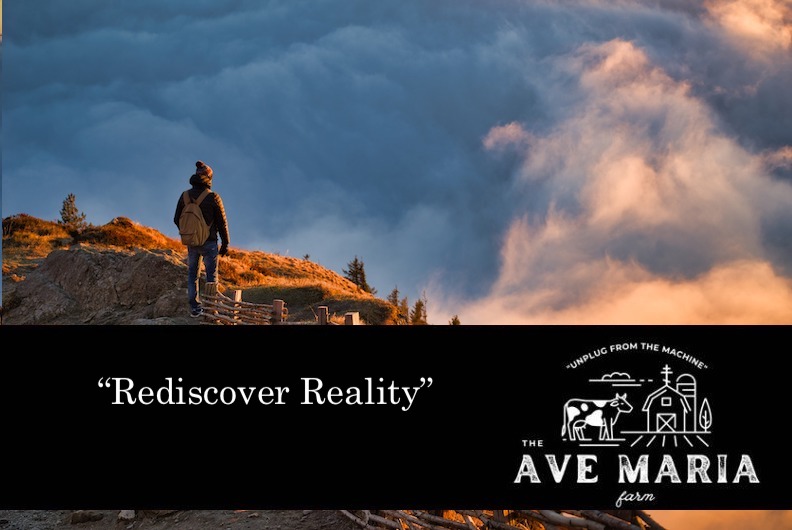“They have mouths, but cannot speak; they have eyes, but cannot see; they have ears, but cannot hear” (Psalm 135:15-16).
Modern man is desperately in need of rediscovering reality. The following quotes and comments explore why this is so and how we may achieve this.
“Ubi amor ibi oculus” ~ “Where love is, there the eye is also”
This cryptic medieval note cuts to the heart of all knowledge. We can know nothing without first loving. We can not love, without first touching, tasting, smelling, hearing, and seeing Reality. Modern man lives in a crisis of never touching the reality around us because our environment cuts us off from that reality. God is reality. Creation is charged with His reality. Christian culture refines and gardens that reality. In doing so, it creates a culture in which the soul blossoms.
Dull Intellects and Spiritual Obesity
John Senior dedicated his life to education and pioneered the great books movement in the late 20th century. With each passing year, he found his students increasingly dull and unprepared for genuine learning. Trained to regurgitate and compute, the modern generations are incompetent in deep thinking.
“Fed on materialism, impregnated by Relativism and blasé, the average student escaped into cheap enjoyments. Not recognizing the deep hunger for truth within themselves, like starving people who are not given healthy food, they gulped down spiritual junk food that made them fall into the illusion that their hunger had been satisfied. Students suffered from a sickness that we might call ‘spiritual obesity,’ which prevented them from growing wings, and ascending toward the stars” (Fr. Francis Bethel, John Senior and the Restoration of Realism, 144).
Recognizing the beginnings of this crisis, C.S. Lewis once commented: “The task of a modern educator is not to cut down jungles, but to irrigate deserts.”
Cut Off From Nature
“There is something destructive — destructive of the human itself — in cutting us off from the earth from whence we come and the stars, the angels, and God himself to whom we go” (Senior).
“Cut off from direct experience of the book of nature by city, suburban and rural life (farms are ‘factories in the field’), we learn to love false images of God through the distortion of his works on television and the science fiction that passes for science in textbooks” (Bethel 143).
The First Steps in Reawakening
“The first step was to liberate his students from the world of artificiality in which they lived. Cheap books, vulgar music, loud fun, alcohol and drugs kept their souls and their minds in a state of stupor…Starting with the great classics…the students — for the first time in their lives — discovered that there was beauty, poetry, nobility that were veiled in the gray world in which they had been living…They were encouraged to learn great poems by heart, to watch the stars, to establish a living contact with the ‘real’ (Bethel xvi).
Gazing at the Universe
“Poor little rich suburban children who have all these delights, and living in constant fluorescent glare, have never seen the stars, which St. Thomas, following Aristotle and all the ancients, say are the first begetters of that primary experience of reality formulated as the first of all principles in metaphysics: that something is” (Senior, bio 143).
“Plato, Aristotle, and St. Thomas spoke of the order of the stars soaring over the entire sky as provoking wonder and launching the intellectual quest for the cause of all things, of the very universe…it was indeed the mystery of the stars’ existence that launched the first philosophers in their quest” (Bethel 144).
“The first necessity is getting ourselves and our children into ‘naked’ contact with the world God made…habitually in our whole way of life’ (Senior, Final Essays, 21).
Gymnastics of the Senses
The first level of education must involve “a vigorous training of the body, the purpose of which [is] not just health and recreation but the acuity of sensing, as sight is sharpened and coordinated by archery…the art of right sensation” (Senior RCC 135).
“Inattentive, blunt senses produce dull minds and hearts, whereas keen, attentive senses and proper delight in reality stir the soul” (Bethel 154).
Turn Off the Stimulus
“Largely because of his separation from nature, modern man’s ability to perceive sensibly and to take delight in his surroundings has deteriorated. His entire environment compels him to gaze vaguely and listen idly; he is both overwhelmed with too much to see and hear, and deprived of anything genuinely interesting to look at or listen to. His senses are restless and distracted with background music everywhere and images flying by as he rushes about in a vehicle. Senior writes about television: ‘Watching it, we fail to exercise the eye, selecting and focusing detail.’ And it is easy enough to realize that the industrial world of fluorescent lights and chlorinated pools attracts our attention and stirs our emotions far less than stars, ponds, candles or fountains” (Bethel 155).
The Restoration of Reason Presupposes the Restoration of Love
“‘Science cannot see without the light of love,’ he wrote. ‘Love first, then seek to understand,’ because ‘the lover is the only one who really sees the truth about the person or the thing he loves.’ The cold, apathetic or utilitarian gaze will remain superficial, usually vague and distracted, whereas true affection renders the mind attentive to the beloved and his deeper values” (Bethel 160).
“Plato compared wonder sparked by beauty to spiritual wings that begin to grow on our shoulders; that is, beauty reminds us of our higher calling. Beauty arouses the soul’s sense of greatness, making it realize that the shadows of this world — riches, power, fame, sensual pleasures — are not what really matter, they are not what we are made for. Beauty invokes in us the sense that we are in the presence of something beyond the material world. Something higher is shining through the sensible” (Bethel 161).

